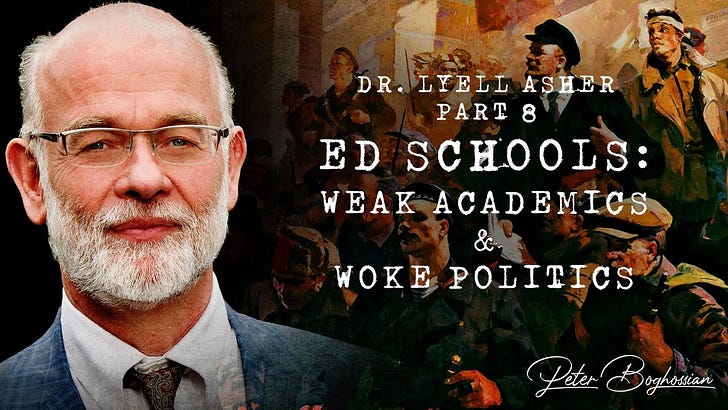When people engage in censorship—when they try to dictate what other people can say and hear—their motives, can take a couple of forms. One, they're incapable of defending the positions they claim to be so certain about, so an open discussion is a threat. Or two, they're unwilling to defend the positions because they're so certain about them. Further discussion seems like a waste of time.
So it's no surprise that the most blatant attempts at censorship and indoctrination on college campuses have come primarily from administrators trained in institutions—ed schools—which combine both of the characteristics I just mentioned. Low academic standards—can't debate, and high-octane political orthodoxy—won't debate.
First, let's take the subject of low academic standards, which has been a problem with ed schools for a century (even at the most prestigious institutions.) In 1933, for example, Harvard President Lawrence Lowell described Harvard's own education school as "a kitten that ought to be drowned" in the decades that followed. Many schools like Yale, Duke, Johns Hopkins and the University of Chicago did drown their ed schools—if not completely, at least partially—by scaling them back.
Though Harvard's own Ed school remains undrowned, in 1969, the Dean and Associate Dean of Harvard ed school admitted that the prevailing climate in the nation's teacher training schools was anything but intellectual. "Study, reflection, debate, careful reading even, yes, serious thinking," they wrote, "is often conspicuous by its absence."
Weak programs tend to attract weak students. In 2015 researcher Jonathan Wai looked at five separate studies over a 75-year period to see if there was a connection between what people majored in or planned to study in grad school and their academic ability as reflected in test scores. Now remember, I'm not talking about individuals here, but group averages.
In any case, out of the five studies he looked at, four of them showed that students pursuing education degrees had the absolute lowest scores. That was the finding of the Army Classification Test from 1946, the Selective Service test from 1951, the Project Talent tests from the 1970s, and the test for admission to graduate school (otherwise known as the GRE) in the early 2000s.
The only exception was the Scholastic Aptitude test of 2014. On that test, students who indicated a primary interest in education came in next to last place—14th out of 15. In addition to their weakness in academics, ed schools are just as notorious for their woke political orthodoxy. This orthodoxy is the result of a historical coincidence. The fact that the greatest expansion of the nation's teacher training schools, which took place in the early 1900s, just happened to occur when the so-called “progressive movement in educational theory” was all the rage.
Two principles of that movement persist in most ed schools to this day. The first principle is that the central mission of the school is to transform society as a whole. As early as 1897, John Dewey, a central figure among progressives, proclaimed that, "education is the fundamental method of social progress and reform." Now by itself, this is a non-controversial idea. I think we all assume, or at least hope, that education will make society better. The trouble is, in the 1920s and thirties, many of the leading figures in the progressive education movement were seduced by a rose-colored image of the Russian Revolution; and, they made socialism and collectivist thinking generally the explicit goal of this educational reform.
This activist political orientation of the ed school establishment has been with us ever since.
Directly related to this political orientation is a second principle: the view that teaching content or subject gets in the way of political reform and should be de-emphasized. Anyone defending content knowledge is thus accused of promoting "rote learning" or "memorizing facts."
A 2004 study by David Steiner and Susan Rozen surveyed course materials taken from 18 of the nation's top-rated ed schools and found that most aspiring K-through-12 teachers in these schools were being taught to be suspicious of knowledge. "Faculty at most of these schools," they wrote, "are often trying to teach a particular ideolog—that traditional knowledge is repressive by its very nature—without directing their students to any substantial readings that question the educational implications of this view."
Given these two so-called “progressive” ed school principles, the first of which encourages woke political activism and the second of which discourages content knowledge, it shouldn't surprise anyone that the tens of thousands of college administrators trained in these institutions have been on the front lines in efforts to restrict speech, to disinvite or deplatform speakers, and to reeducate students with politically biased orientation sessions, language guides and training programs.
In the next video, I'll look at what happened in just one decade to the topic of justice.
Watch this video and all previous videos on YouTube, Odysee, or Rumble.
Video shot and edited by Travis Brown | The Signal Productions (Locals, Twitter, YouTube); Motion graphics by Gav Patel (Twitter, Instagram)



I took many education courses in college, all early in the morning so I could extend my sleep. Absolutely worthless.